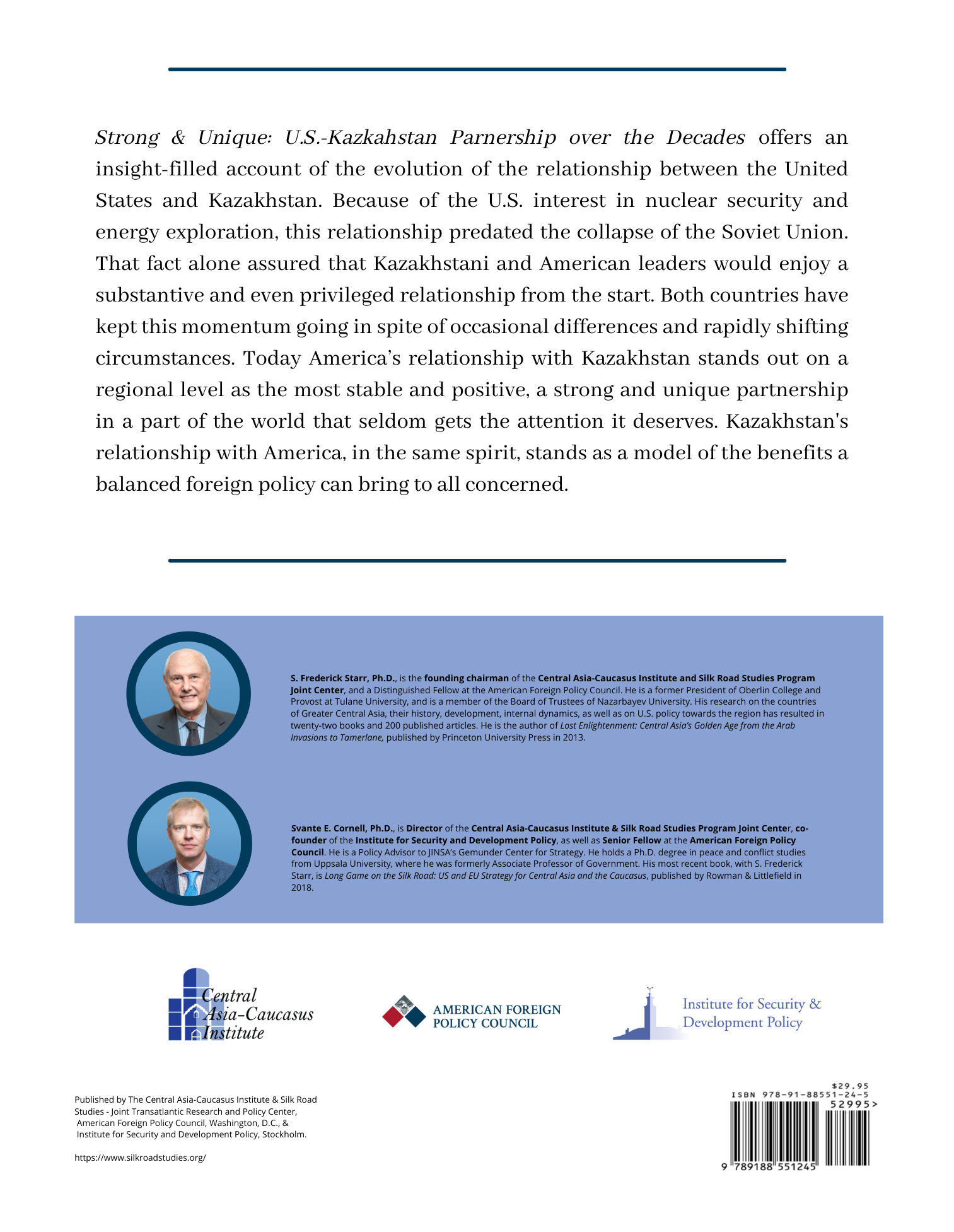CACI Initiative on Religion and the Secular State in Central Asia and the Caucasus
In 2016, the Central Asia-Caucasus Institute & Silk Road Studies Program launched an initiative on documenting the interrelationship of religion and the secular state in the region. This initiative departed from the fact that little systematic reserch had been undertaken on the subject thus far. While there was and remains much commentary and criticism of religious policy in the region, there was no comprehensive analysis available on the interrelationship of religion and the state in any regional state, let alone the region as a whole. The result of this initiative has been the publication of six Silk Road Papers studying the matter in regional states, with more to come. In addition, work is ongoing on a volume putting the regional situation in the context of the Muslim world as a whole.
Case Studies
Each study below can be freely downloaded in PDF format.
Azerbaijan's Formula: Secular Governance and Civil Nationhood
By Svante E. Cornell, Halil Karaveli, and Boris Ajeganov
November 2016
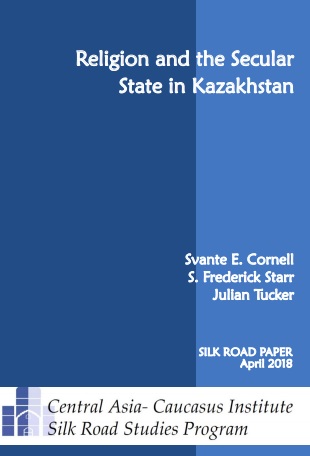 Religion and the Secular State in Kazakhstan
Religion and the Secular State in Kazakhstan
By Svante E. Cornell, S. Frederick Starr and Julian Tucker
April 2018
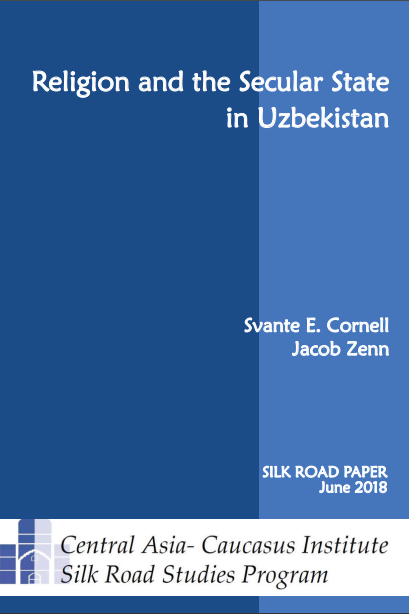 Religion and the Secular State in Uzbekistan
Religion and the Secular State in Uzbekistan
Svante E. Cornell and Jacob Zenn
June 2018
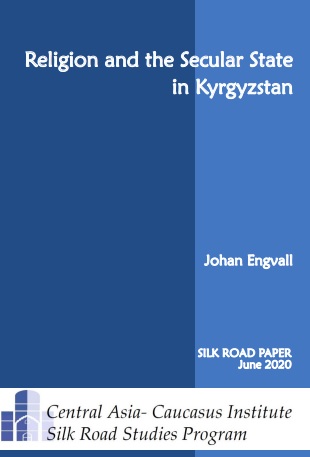 Religion and the Secular State in Kyrgyzstan
Religion and the Secular State in Kyrgyzstan
Johan Engvall
June 2020
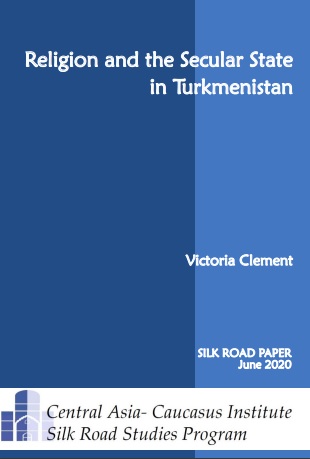 Religion and the Secular State in Turkmenistan
Religion and the Secular State in Turkmenistan
Victoria Clement
June 2020
Articles and Analyses
Svante E. Cornell, "Religion and the State in Central Asia," in Ilan Berman, ed., Wars of Ideas: Theology, Interpretation and Power in the Muslim World, Lanham, MD: Rowman & Littlefield, 2021.
Svante E. Cornell, "Central Asia: Where Did Islamic Radicalization Go?" in Religion, Conflict and Stability in the Former Soviet Union, eds. Katya Migacheva and Bryan Frederick, Arlington, VA: RAND Corporation, 2018.
Kazakhstan's Crisis Calls for a Central Asia Policy Reboot
Svante E. Cornell
The recent crisis in Kazakhstan took many by surprise. Long considered the most prosperous and stable in Central Asia, it now suddenly appears fragile and weak. To draw lessons from the crisis, for the country’s future course and for the long-suffering American policy in Central Asia, we need to understand what really happened in Kazakhstan. While the exact circumstances of the tragic events in the country may never be clear, we now know enough to draw some key conclusions. First, the key reason for this crisis is to be found in Kazakhstan’s incomplete succession of power. Second, while Russia will definitely exact a price for its intervention, Kazakhstan’s independence has not come to an end. Third, Kazakhstan will likely recover from this crisis, but it will need American and European support to proceed with much-needed reforms.
What Happened?
To someone who has studied Central Asian politics for over two decades, the speed and confidence with which many analysts claimed to understand exactly what had happened was somewhat distressing. In reality, the behind-the-scenes power balances in Kazakhstan are some of the most opaque in the region.
Still, it is now clear that two separate processes took place in Kazakhstan. The first was fairly straightforward: a sharp price hike for automobile fuel led to public protests in western Kazakhstan, which rapidly spread to the country’s largest city, Almaty. Given the frequency of public protests in Kazakhstan lately, this was unsurprising. But the second was more puzzling: on the evening of January 4, bands of armed thugs suddenly took over the Almaty protests, and engaged in violent attacks on authorities and government buildings. Eyewitnesses on the ground report that security forces appeared to melt away in the face of these thugs, with widespread destruction and looting as a result.
Sensing that the situation was spiraling out of control, and perhaps unable to trust his own security forces, President Kassym-Jomart Tokayev on January 5 appealed to the Russia-led Collective Security Treaty Organization for s “temporary” intervention. Within hours, a “peacekeeping” operation was dispatched to Kazakhstan. Appealing for outside help is a major loss of face for any government, and to legitimize this step beyond assuring it would be of short duration, Kazakh government officials blamed a nebulous international terrorist conspiracy for masterminding the violence. This has rightfully been met with skepticism. Meanwhile, western rights advocates have emphasized the government’s repression of peaceful protests. This is not a particularly helpful definition of the events either: it hardly explains the violence against authorities in Almaty, and why the government seemed so close to losing control over the situation. In fact, the real background is to be found in Kazakhstan’s informal politics.
Nazarbayev’s Political Economy
Like most post-Soviet states, Kazakhstan’s informal politics are based on a close fusion of political and economic power. This was the result of the Soviet Union’s collapse, which left the politically connected with tremendous advantages in securing economic assets and taking the reins of a budding capitalist economy. Meanwhile, the absence of strong political institutions meant that political leaders required an economic base, in effect to control institutions that provided patronage and ensured the loyalty of their followers.
As a result, the power of post-Soviet politicians has been more a function of their control over patronage than the position printed on their business card. To survive in power, therefore, the leader of a country needed to have a larger patronage structure than anyone else. Because blood is thicker than water, family members of high officials were key to managing these assets. Sadly, however, some suddenly enriched family members did not handle their newfound wealth with grace. Managing wayward children and relatives became a constant headache for post-Soviet leaders. And beyond the family are other, largely invisible grandees who remains largely out of the public view but wield real influence.
Thus it was in Kazakhstan as well, where the children and relatives of President Nazarbayev ended up in the news for all the wrong reasons. Still, Kazakhstan’s hydrocarbon-fueled economy until recently produced enough wealth for the wider population to see improved living standards, while Nazarbayev’s diplomatic astuteness in balancing Russia, China and the West led him to become a respected international figure.
But in recent years, financial shocks hit the country hard, and Kazakhstan’s budding middle class saw its newfound standard of living jeopardized: GDP per capita dropped from over $13,000 in 2013 to about $9,000 today. As a result, the population grew restive, and frustration with the opulence of the uber-rich and politically connected mounted. Furthermore, a divide opened between an upwardly mobile and well-educated urban strata (the Kazakhs most Westerners interact with) and a much larger lumpen segment, for lack of a better term, which is much more impatient and nationalist. Against this background, the post-Soviet model of governance described above was no longer sustainable.
In response, the aging Nazarbayev resolved to engineer a controlled transition of power. He first gave parliament a greater role, then unexpectedly resigned in 2019. He designated the respected diplomat Kassym-Jomart Tokayev his successor but retained significant powers as the country’s “First President.” This move was designed to safeguard the family’s interests, while allowing a new leader to implement much-needed political and economic reforms.
Knowns and Unknowns in an Incomplete Succession
While Nazarbayev had outlined lofty visions for Kazakhstan as one of the world’s most developed states by mid-century, international indices showed clearly that the country was progressing slowly in terms of rule of law and control over corruption, and barely at all in terms of public voice and accountability. Tokayev therefore embarked on a single-minded pursuit of political as well as economic reforms. But in so doing, he challenged the position of entrenched interest groups that controlled much of Kazakhstan’s economic life, and wielded considerable informal power in key state institutions.
Many of these were members of the Nazarbayev family, and networks associated with them, including the invisible grandees mentioned above. Some among these forces sought to actively slow-walk Tokayev’s reforms: on more than one occasion, the President’s initiatives were watered down in parliament, while others appeared to face hurdles in implementation. This led the President himself to repeatedly decry the pace at which his reforms were proceeding. In retrospect, the key flaw in Nazarbayev’s transition plan seems to have been engineering a transition of formal political power, but not a parallel transition in control of economic assets.
Exactly how the tensions between the President and his opponents boiled over is not clear. But it is beyond doubt that they exploded during the New Year’s unrest. In a country like Kazakhstan, it is unthinkable that organized groups of armed thugs could mount a direct challenge to the state without being noticed and checked by security services. But as anyone familiar with post-Soviet ties between politics, business and crime can tell, it is more than likely that these thugs were used by some powerful political force that masterminded this action. Some suggest President Tokayev moved first, using the public protests as an opportunity to clean house. More likely, his opponents sought to use the unrest to weaken or even unseat him, forcing a counterpunch.
President Tokayev’s response to the crisis is telling: he removed Nazarbayev from his lifetime post as Chairman of the National Security Council, removed and detained leaders of the national security service, and in the aftermath of the crisis forced the removal of key Nazarbayev family members from senior positions in government agencies and state corporations. Tokayev’s January 11 address to parliament did not mention his predecessor by name, but he was clear enough: he announced the closure of monopolistic companies everyone knew were connected to the Nazarbayev family, and called on the many people who had gotten rich “thanks to his predecessor” to give back to the country in a new public fund he is creating. We should expect important assets to change hands in coming weeks.
Still, it would be premature to call this a direct, personal conflict between the only two Presidents that Kazakhstan has known since independence. One important unknown is the degree to which the 81-year-old Nazarbayev was in control over the vast conglomerate that his family had become. The Nazarbayev family was far from a united entity, and different wings of the family were known to have fought over economic assets in the past. Thus, Nazarbayev and his family are not one and the same; parts of his family may be involved in a conflict with President Tokayev, but that does not mean the entire family or Nazarbayev himself is.
President Tokayev has been careful, until now, not to directly challenge the position or legacy of Nazarbayev as the Elbasy, the nominal “leader of the nation.” Doing so would perhaps crumble too much of the edifice his own power rests upon, and Tokayev appears to genuinely appreciate Nazarbayev’s service to the nation. Still, a decisive shift has taken place in Kazakhstan. The most likely scenario is that Nazarbayev will continue to be respected as the country’s elder statesman, while his extended family will gradually lose their positions of influence as well as many of their assets.
The Russia Factor
The CSTO intervention in Kazakhstan is a major coup for President Putin, who has touted the CSTO as a Eurasian counterpart to NATO, and sought to portray it as an organization that could help regional leaders withstand both domestic and outside threats to their power. But in the past few years, neither Moscow nor the CSTO were able to rescue leaders in Armenia or Kyrgyzstan that were targeted by public protests. The lightning-speed deployment will now be an example to leaders who may previously have been skeptical about Russia’s commitment to their security.
Beyond that, there has been a tendency to view the CSTO intervention in the light of Russia’s threat against Ukraine. But the situations are not comparable. There is no question that the Russian intervention will have consequences for Kazakhstan’s foreign policy and for regional security, but it does not spell the end of Kazakhstan’s independence.
President Tokayev has reported that the CSTO operation is winding down and that the foreign forces are in the process of leaving the country. From Kazakhstan’s perspective, they have accomplished their chief objective: they have ended, for now, the acute phase of elite in-fighting in Kazakhstan, and shown with all due clarity that Moscow supports President Tokayev against his detractors.
Given the past experience of Russian operations in the former Soviet Union, one could be forgiven for being skeptical that once invited, Russian forces would leave Kazakhstan. But there are at least three reasons to think that might actually happen. First, China has made it clear it wants to see no foreign forces in Kazakhstan, and Moscow is very sensitive to Beijing’s wishes. Second, Moscow has found itself in the unprecedented predicament of taking the side of a President that is identified with a reformist agenda. And if Tokayev wants to consolidate his power, he can do so only if he appears in charge and his reforms are implemented. If Tokayev is perceived as a Russian stooge, he could rapidly lose his standing in Kazakh society, resulting in further unrest and instability, something that is not in Russia’s interest. Finally, it should be recalled that Tokayev is the architect of Kazakhstan’s balanced “multi-vector” foreign policy, which seeks to build strong relations with all world powers, not just Russia.
It may thus be in both Tokayev’s and Putin’s interest for Russian forces to pull back, with Tokayev owing Putin a debt of gratitude. The alternative – installing a Putinist regime in Kazakhstan that quells public disenchantment with force – is simply not feasible, and not something Tokayev could or would do. The widespread public frustration and anger remains, and will not go away. Tokayev will be forced to tread carefully to avoid new upheavals.
American and European Policies
Three major events in the past year or so have shown the decline in American, as well as European, influence in Central Asia and the Caucasus. The U.S. was essentially a bystander during the war between Armenia and Azerbaijan in late 2020. The chaotic American withdrawal from Afghanistan epitomized the American disengagement, and the U.S. did not feature in any notable way during the crisis in Kazakhstan. This slide is unfortunate, not least given the fact that every other power from Turkey in the west to Japan in the east appears to be intensifying its relations with this emerging world region. U.S. inaction in the region makes it that much harder for regional states to have a balanced foreign policy. Particularly following the withdrawal from Afghanistan, it is now high time for the U.S. to revamp its approach to Central Asia, starting with a reappraisal of relations with Kazakhstan.
If the U.S. is concerned about Russian influence, the solution is not to distance itself from Kazakhstan but rather to redouble engagement with the country and President Tokayev. Tokayev continues to represent the best hope for a serious reform process that will make Kazakhstan both more stable and more responsive to the needs and views of its citizens. Simply because of the nature of Russia’s own political system, there is little Russia can or would do to support the reform process that Tokayev has launched. In fact, the only outside actors that could play a constructive role are the U.S. and Europe. Tokayev knows this and will want to re-engage with Western powers. But given his new predicament, this will be much easier if the initiative comes from Washington.
Kazakhstan must also be seen in its regional context. In the last few years, Central Asian states have engaged in an unprecedented effort to develop regional cooperation, to ensure they can manage regional problems on their own. The CSTO intervention is in this context a setback, because it gives the illusion that only outside powers can provide security in the region. It is therefore in the American interest to support efforts at regional cooperation that will, in the longer run, enable Central Asians to withstand both Russian and Chinese aspirations for hegemony.
Washington has an instrument for dialogue that is regional in nature. A first step should be to convene a meeting of the C5+1 mechanism including America and the five regional states to signal that America continues to care about developments in the region, and is ready to step up efforts to support reform initiatives and regionalism in Central Asia. Building on that, the Administration could deploy an inter-agency process to fine-tune the Central Asia strategy that was adopted two years ago. While much remains to be done, these steps would kickstart a reboot of American policy toward Central Asia.
Svante E. Cornell is Director of the American Foreign Policy Council’s Central Asia-Caucasus Institute, and a co-founder of the Institute for Security and Development Policy in Stockholm.
Political and Economic Reforms in Kazakhstan Under President Tokayev
By Svante E. Cornell, S. Frederick Starr and Albert Barro
Central Asia-Caucasus Institute & Silk Road Studies Program
Silk Road Paper
November 2021
Executive Summary
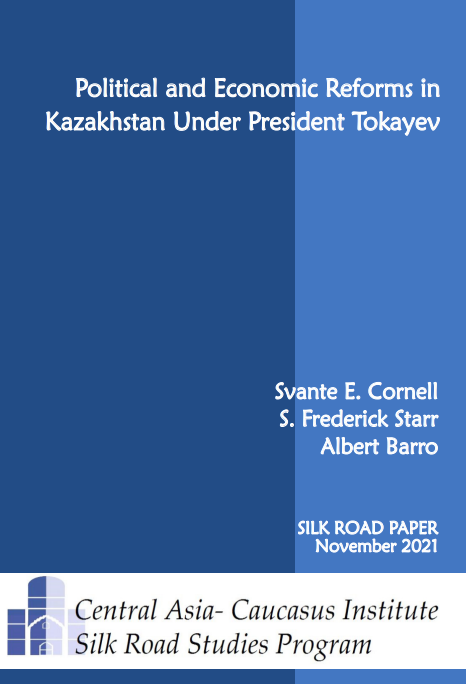 Kazakhstan’s leaders have long harbored ambitious visions for their country’s future. The country’s first President, Nursultan Nazarbayev, launched several far-reaching goals for the country’s development, most notably in 2012 the “Kazakhstan 2050” strategy, which aimed for Kazakhstan to take a place among the world’s 30 most developed states by mid-century.
Kazakhstan’s leaders have long harbored ambitious visions for their country’s future. The country’s first President, Nursultan Nazarbayev, launched several far-reaching goals for the country’s development, most notably in 2012 the “Kazakhstan 2050” strategy, which aimed for Kazakhstan to take a place among the world’s 30 most developed states by mid-century.
For a young country in the third decade of its independence, such lofty goals clearly required far-reaching reforms. Still, Kazakhstan’s leadership focused primarily on reforming the country’s economy. While acknowledging the need for political reforms, the leadership explicitly followed a strategy that prioritized the economy. President Nazarbayev on numerous occasions stated that “we say: the economy first, then politics.”
But major shifts in the global political economy in the past decade forced a revision to this strategy. By 2015, it had become clear that a focus on economics alone would not be sufficient for Kazakhstan to reach its stated goals. In fact, the diversification of the economy required measures that went deep into the political realm. Furthermore, very much as a result of the country’s successful economic development, the population of Kazakhstan increasingly voiced demands for political reform as well.
Reform initiatives in the political sphere began to be launched prior to President Nazarbayev’s unexpected resignation in March 2019. Among other, constitutional amendments were introduced to strengthen the role of parliament. Following the election of President Kassym-Jomart Tokayev, the reform agenda explicitly focused on political and economic fields in simultaneous, parallel tracks. In the three yearly State of the Nation addresses that President Tokayev has held, he has issued at times scathing criticism of the state of affairs in various sectors of the country’s governance, and emphasized the priority accorded to systemic reform.
President Tokayev introduced new institutions to oversee reforms, most notably the National Council of Public Trust, which brings together government officials and respected members of civil society. This institution, and its working groups, has been a vehicle for the generation of and deliberation on ideas for reforms.
Reforms in the economic field have been ambitious. Kazakhstan’s economy has been primarily driven by the exportation of oil and natural gas. However, the 2008 and 2014 price shocks revealed just how vulnerable the Kazakhstani economy was to the oil price, and it catalyzed a mobilization toward reform to reduce the country’s dependence on fossil fuels. Toward this end, the country seeks to energize its manufacturing and agricultural sectors. In manufacturing, the country is focused on developing an ‘economy of simple things’ in which the nation becomes a primary producer of all the low-tech products that Kazakhstanis use every day. For agriculture, the country is mobilizing government resources to support seven separate ‘ecosystems’ of food and agricultural production.
To drive technological advancement, Kazakhstan is undergoing a number of reforms that will develop an entrepreneurial culture, attract investments in the tech industry, and lay the foundation for Kazakhstan to serve as a technological hub in Central Asia. The country has already progressed significantly on an initiative known as “Digital Kazakhstan,” which seeks to transform the way that citizens, businesses, and government bureaus all interact with each other. The strategy employs modern technologies like AI, 5G, and Smart City technology to boost R&D, e-commerce, venture financing, and fintech development. As part of this strategy, Kazakhstan opened a financial and technological innovation hub in 2018, known as the Astana International Financial Centre, to attract investments, support innovation, and arbitrate disputes in private business.
President Tokayev’s reforms in the human rights area can be divided into two categories: a first where the government clearly seeks to achieve change, but has struggled to find ways to succeed; and a second in which steps taken are more cautious. In the former category, President Tokayev has embarked on a mission to effectuate a wholesale redefinition of the role of law enforcement in society, abandoning the Soviet-era model whereby the police is a tool of the state in favor of a modern police force that provides service to citizens. This includes change in the judiciary system, to make the court system more adversarial, separate prosecutors from judges, and put defense and prosecution on an equal standing. Similarly, the issue of women’s rights gained importance during the pandemic, amidst an increase in reported violence against women. President Tokayev has made this issue a priority, ordering the strengthening of special units in the Ministry of Internal Affairs focused on domestic abuse, and the start of a nationwide campaign to end violence against women. Still, at lower levels of the state apparatus the resistance to change appears to remain, in contrast to the visible interest of top echelons to put an end to this problem.
The government is proceeding more cautiously in areas like freedom of speech and assembly. Affirming the importance of “overcoming the fear of alternative opinion,” President Tokayev launched reforms to Freedom of Assembly under which peaceful rallies now require only notification of, rather than permission from authorities. The law promulgated in May 2020 nevertheless did not go quite as far the President indicated, as local executive bodies maintain the power to reject the holding of rallies. Concerning freedom of speech, limited reforms have been introduced, such as the decriminalization of defamation, a tool frequently used to stop efforts to expose wrongdoing by government officials. Similarly, laws against the vaguely defined “fomenting” of hatred were changed to “incitement.” These changes will have an effect if the culture of officialdom changes – if, that is, the mentality of the judicial system shifts from one that instinctively protects officials from citizens to one protecting citizens from officials.
Reforms in the field of political participation have been cautious. Domestically, the leadership is torn between growing public demands for a greater voice and the elite’s inherent caution, coupled with the need to manage entrenched interests skeptical of liberalization. Externally, the government is similarly torn between Western pressure to liberalize and Russian and Chinese urges to maintain control over the political system.
President Tokayev launched reforms focusing on the strengthening of parliament and the expansion of democratic procedures at the local level. Regarding the parliament, efforts focus on filling the parliament with substance and ensuring it is more representative of society. The President urged Members of Parliament to be more active, and to make use of their prerogative to exercise oversight over the government’s actions.
Tokayev’s first package of political reforms included measures that reduced the number of signatures needed for forming a political party. Further, political parties now need to have a quota of at least 30 percent for women and youth on their lists. In addition, the package included reforms to build “a tradition of parliamentary opposition.” These changes for the first time recognized the official role of opposition parties in the country’s political system, by guaranteeing the opposition the chairmanship of one standing committee and the position of secretary of two standing committees in the lower chamber; opposition parties can now also initiate parliamentary hearings at least once per session of parliament. It should ne noted that these reforms focus only on “systemic” or loyal opposition parties, and did nothing for the political forces that remain outside the political system. As such, these reforms focus on the long-term building of parliamentary culture that involves a role for the loyal opposition. A third package of reforms in January 2021 reduced the threshold for parliamentary representation from seven to five percent. It remains to be seen if this will lead to the emergence of new political forces.
In a separate initiative, reforms were introduced to expand the role of elections at the local level, in order to build a culture of democracy from the grassroots up. Such elections have now been introduced in rural areas as a pilot project. The elections that followed did not lead much substantive change, as the ruling party dominated these local elections. It remains to be seen if the leadership will gradually expand this model to ensure the election of akims of larger settlements or cities as well.
Both Nazarbayev and Tokayev have noted that Kazakhstan cannot move into the world’s top 30 most developed nations without making serious reforms to improve its judicial system and to address corruption. Reforms in this realm are primarily guided by the work of the OECD’s Anti-Corruption Network (ACN), which established in 2003 the Istanbul Anti-Corruption Action Plan (ACAP). In response to recommendations that have been given in the ACAP, Kazakhstan wrote an Anti-Corruption Strategy for the years 2015-2025. The strategy has six primary focuses: corruption in public service, corruption in private business, corruption in the judiciary and law enforcement, instituting public control, developing an anti-corruption culture, and developing international partnerships. Since the strategy was launched, Kazakhstan has made headway on all fronts, and this is evident in the progress reports provided by the OECD.
To combat corruption, Kazakhstan’s government reorganized the country’s law enforcement to include an Anti-Corruption Service that reports directly to the president. Additionally, a number of regulations were instituted that increase accountability on government officials and restrict their ability to engage in corrupt behavior. Recruitment and selection processes have been overhauled for public servants and judges alike, and a higher degree of emphasis has been placed on their character. “Digital Kazakhstan” has also reduced the opportunities for illicit interactions between citizens and government officials by removing direct human-to-human contact in most public services. The country has piloted a new policing program in Karaganda that will employ a “police-service model” to transform the way that police and citizens interact with one another. Finally, Kazakhstan has made efforts to include civil society in the fight against corruption by passing laws like “On Access to Information” that will allow NGOs to monitor the behavior of business and government entities and to participate in the dialogue on anti-corruption policy reform. All these efforts are taking place in the context of increased partnership with international organizations that have provided guidance on how to incorporate international standards in Kazakhstan’s reforms. This includes not only OECD, but also UNDP, OSCE, and more recently GRECO. The results of this work have already been measured in progress that Kazakhstan has made on different corruption indexes, including Transparency International’s Corruption Perceptions Index, and the World Banks’ World Governance Indicators.
CACI Book Event - Strong and Unique: Three Decades of U.S.-Kazakhstan Partnership
The Central Asia-Caucasus Institute invites you to join us for a book launch event on Thursday 9 December, 2021. Strong and Unique: Three Decades of U.S.-Kazakhstan Partnership, authored by Dr. S. Frederick Starr and Dr. Svante E. Cornell, offers an insight-filled account of the evolution of the relationship between the United States and Kazakhstan. Given the U.S.' interest in nuclear security and energy exploration, this relationship predates the collapse of the Soviet Union; Kazakhstani and American leaders enjoyed a substantive and even privileged relationship from the outset. Over the past three-and-a-half decades, both countries have maintained this momentum despite occasional differences and rapidly shifting circumstances.
Today, America’s relationship with Kazakhstan stands out on a regional level as the most stable and positive -- a strong and unique partnership in a part of the world that seldom gets the attention it deserves. Kazakhstan's relationship with America, in the same spirit, stands as a model of the benefits a balanced foreign policy can bring to all concerned.
Lunch will be served.
Speakers:
Dr. S. Frederick Starr, Chairman, Central Asia-Caucasus Institute
Ambassador Erzhan Kazykhan, Special Representative of the President of Kazakhstan for International Cooperation
Ambassador Richard Hoagland (Ret.) former U.S. Ambassador to Kazakhstan
Moderator: Dr. Svante E. Cornell, Director, Central Asia-Caucasus Institute
Where: The Ritz Carlton, 1150 22nd St NW, Washington DC; Main Ballroom
When: Thursday, December 9, 2021, from 11:30 AM to 1.30 PM. The Presentation will start at Noon.
Strong and Unique: Three Decades of U.S.-Kazakhstan Partnership
Strong and Unique: Three Decades of U.S.-Kazakhstan Partnership
By S. Frederick Starr and Svante E. Cornell
Prefaces by Amb. Erzhan Kazykhan and Richard Hoagland
Illustrations
Preface by Ambassador Erzhan Kazykhan
Preface by Ambassador Richard Hoagland
Chapter One: Dramatic Beginnings
Chapter Two: Accelerating Engagement
Chapter Three: Changing Priorities
Chapter Four: Embracing New Variables
Chapter Five: New Focus, New Grounding
Chapter Six: Kazakhstan and the United States: Achievements and Challenges
Appendices

